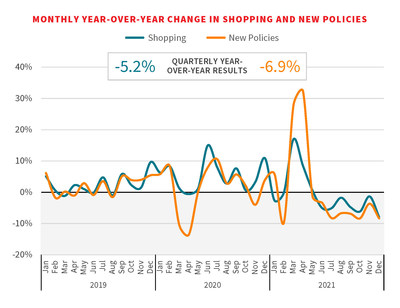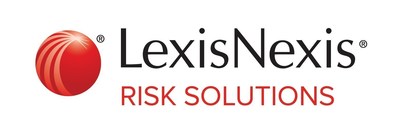LexisNexis Insurance Demand Meter Shows Decline in U.S. Auto Insurance Shopping in Q4
The LexisNexis Risk Solutions Insurance Demand Meter reveals a 5.2% decrease in the annual U.S. auto insurance shopping growth rate for Q4 2021, down from 3.9% in Q3 2021. New policy growth for the quarter was -6.9% compared to Q4 2020, slightly improving from -7.3% in the previous quarter. Insurers have responded to declines by cutting marketing efforts and focusing on rate increases to improve profitability amid rising claims costs.
Looking ahead, volatility in vehicle and insurance shopping may continue due to ongoing challenges, including automotive chip shortages.
- None.
- None.
Insights
Analyzing...
ATLANTA, Feb. 17, 2022 /PRNewswire/ -- The latest edition of the LexisNexis® Risk Solutions Insurance Demand Meter reports the overall annual U.S. auto insurance shopping growth rate dropped to -
With Vehicle Sales Down, Insurance Market Feels the Impact
2021 was marked by yet another year of shopping volatility, shaped largely by continued pandemic-related influences. However, Q4 shopping volumes trended back to the traditional seasonal pattern and volumes exhibited in 2019, including drops aligned to holiday weeks.
Lower vehicle sales for Q4 and for the year meant insurers continued to see a negative impact on the bottom line. Compounding the lower sales was a return in 2021 to more normal driving patterns, leading to an uptick in claims frequency coupled with abnormal increases in claims severity. Insurers responded by scaling back marketing efforts in Q3 and through Q4 with a significant reduction of year-over-year direct mail activity.
"Over the past two years, the automotive and auto insurance industries have been marked by shopping ebbs and flows that have, at times, been a complete departure from what we're accustomed to seeing – particularly the unusual trends we saw in 2020," said Adam Pichon, vice president and general manager of Auto Insurance at LexisNexis Risk Solutions. "While early 2021 again showed surprising upticks in shopping behavior influenced by macroeconomic conditions, we're seeing things begin to trend back to the norm over the last two quarters. As a result, consumers across the country have seen their insurance rates rise steadily in recent months as insurers have been on their toes evaluating profitability as more drivers are getting back on the road."
Looking Ahead to the Remainder of 2022
2022 could be headed for another year of vehicle and insurance shopping volatility in year-over-year growth rates. Key items to keep an eye on will be how the market reacts to ongoing automotive chip shortages and how consumers respond to the lack of stimulus checks and no further annual child tax credits (unless they opted out of the stimulus measure).
Pichon said there is still reason for optimism on 2022 growth, however:
"Conversely, shopping activity increases this year could be on the horizon as the carrier rate increases take effect over the course of the year," continued Pichon. "Historically, significant rate disruption has been a catalyst for high shopping volumes in the market."
Download the latest Insurance Demand Meter.
About the LexisNexis Insurance Demand Meter
The LexisNexis Insurance Demand Meter is a quarterly analysis of shopping volume and frequency, new business volume and related data points. LexisNexis Risk Solutions offers this unique market-wide perspective of consumer shopping and switching behavior based on its analysis of billions of consumer shopping transactions since 2009, representing nearly
About LexisNexis Risk Solutions
LexisNexis® Risk Solutions harnesses the power of data and advanced analytics to provide insights that help businesses and governmental entities reduce risk and improve decisions to benefit people around the globe. We provide data and technology solutions for a wide range of industries including insurance, financial services, healthcare and government. Headquartered in metro Atlanta, Georgia, we have offices throughout the world and are part of RELX (LSE: REL/NYSE: RELX), a global provider of information and analytics for professional and business customers. For more information, please visit www.risk.lexisnexis.com, and www.relx.com.
Media Contacts:
Chas Strong
LexisNexis Risk Solutions
Phone: +1.706.714.7083
Charles.Strong@lexisnexisrisk.com
Mollie Holman
Brodeur Partners for LexisNexis Risk Solutions
Phone: +1.646.746.5611
mholman@brodeur.com
![]() View original content to download multimedia:https://www.prnewswire.com/news-releases/lexisnexis-insurance-demand-meter-shows-decline-in-us-auto-insurance-shopping-in-q4-301484861.html
View original content to download multimedia:https://www.prnewswire.com/news-releases/lexisnexis-insurance-demand-meter-shows-decline-in-us-auto-insurance-shopping-in-q4-301484861.html
SOURCE LexisNexis Risk Solutions








